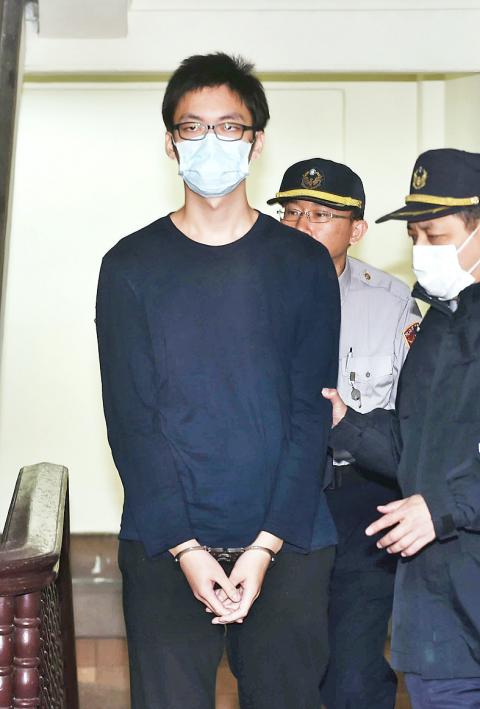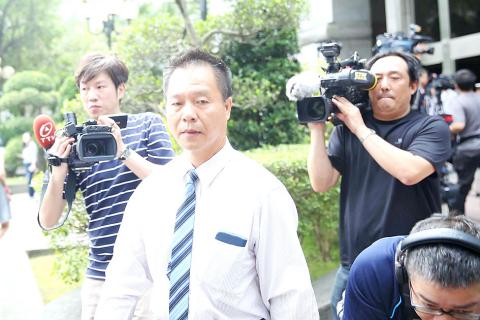The Supreme Court yesterday upheld the death sentence for Cheng Chieh (鄭捷), who was convicted of stabbing four people to death and injuring 22 in a May 21, 2014, attack in the Taipei MRT rail system.
The verdict is final and cannot be appealed.
The court’s ruling said it upheld the death penalty because there was clear evidence that the defendant had committed an act defined as one of the most severe crimes by the UN’s International Covenant on Economic, Social and Cultural Rights and the International Covenant on Civil and Political Rights.

Photo: Fang Pin-chao, Taipei Times
The New Taipei City District Court on March 6 last year convicted Cheng of four counts of murder and 22 counts of attempted manslaughter, handing down the death sentence for each murder charge and prison sentences ranging from five to eight years for a total of 144 years on the manslaughter charges.
It also ordered him to pay NT$30.91 million (US$956,078) in compensation to his victims, as well as NT$8.55 million to the families of the four dead.
The Taiwan High Court in October last year upheld the convictions, but ordered Cheng to pay NT$61.39 million in compensation to his victims and the relatives of those slain.

Photo: CNA
Cheng’s defense appealed that verdict to the Supreme Court.
The Supreme Court said the four death sentences were “commensurate with the crimes committed,” adding that the rulings handed down by the courts must be based on the laws of the nation, which still include capital punishment.
The justices also said that Cheng was of sound mind and in control of his actions at the time of the attack, and there was no indication of a psychiatric disorder or loss of mental faculties.
They said that even if an appraisal by experts indicated the defendant had a minor psychological disturbance, it still would not affect their decision.
Liang Chia-ying (梁家贏), one of Cheng’s defense lawyers, said the verdict was regrettable.
“The courts did not fully investigate Cheng’s motives, nor did they attempt to determine if his mental state was affected by illness,” Liang said.
Cheng is currently the 43rd death row inmate.
Minister of Justice Luo Ying-shay (羅瑩雪) denied a media report that top judiciary officials had met in the afternoon to determine when to execute Cheng.
“We have not received the official documents of the judgment, and we did not discuss this issue. We do not have a schedule for the execution,” she said.
The father of Chang Cheng-han (張正翰), one of the four slain, said that he hopes the execution can be carried out soon.
“The ruling provides justice for society. The murderer must pay with his life for his crimes,” he said. “We still see random killings in our society. The sooner Cheng Chieh is executed, the sooner it will serve as a warning to people and prevent such killings from happening again.”
Chiu Mu-sen (邱木森), husband of Pan Pi-chu (潘碧珠), another slain victim, said he thought justice had been served.
Chiu, who had been married to Pan for more than 40 years, said “a fair verdict had been handed down for her murder.”
Additional reporting by CNA

CHAOS: Iranians took to the streets playing celebratory music after reports of Khamenei’s death on Saturday, while mourners also gathered in Tehran yesterday Iranian Supreme Leader Ayatollah Ali Khamenei was killed in a major attack on Iran launched by Israel and the US, throwing the future of the Islamic republic into doubt and raising the risk of regional instability. Iranian state television and the state-run IRNA news agency announced the 86-year-old’s death early yesterday. US President Donald Trump said it gave Iranians their “greatest chance” to “take back” their country. The announcements came after a joint US and Israeli aerial bombardment that targeted Iranian military and governmental sites. Trump said the “heavy and pinpoint bombing” would continue through the week or as long

TRUST: The KMT said it respected the US’ timing and considerations, and hoped it would continue to honor its commitments to helping Taiwan bolster its defenses and deterrence US President Donald Trump is delaying a multibillion-dollar arms sale to Taiwan to ensure his visit to Beijing is successful, a New York Times report said. The weapons sales package has stalled in the US Department of State, the report said, citing US officials it did not identify. The White House has told agencies not to push forward ahead of Trump’s meeting with Chinese President Xi Jinping (習近平), it said. The two last month held a phone call to discuss trade and geopolitical flashpoints ahead of the summit. Xi raised the Taiwan issue and urged the US to handle arms sales to

State-run CPC Corp, Taiwan (CPC, 台灣中油) yesterday said that it had confirmed on Saturday night with its liquefied natural gas (LNG) and crude oil suppliers that shipments are proceeding as scheduled and that domestic supplies remain unaffected. The CPC yesterday announced the gasoline and diesel prices will rise by NT$0.2 and NT$0.4 per liter, respectively, starting Monday, citing Middle East tensions and blizzards in the eastern United States. CPC also iterated it has been reducing the proportion of crude oil imports from the Middle East and diversifying its supply sources in the past few years in response to geopolitical risks, expanding

OTHER OPTIONS: Given possible US intervention and Taiwanese counterattacks, China might opt to blockade Taiwan or take its outlying islands instead of an all-out invasion A US think tank has urged Taiwan to adopt a “hellscape” strategy that would flood the Taiwan Strait with drones and other uncrewed systems to deter invasion by China. In its report, Hellscape for Taiwan, published on Thursday, the Center for a New American Security said Taipei’s asymmetric defense approach — often described as a “porcupine strategy” — needs to evolve to keep pace with the growing capabilities of the Chinese People’s Liberation Army. The “hellscape” strategy involves saturating the air and waters around Taiwan with thousands of drones and other platforms capable of striking invading forces from multiple domains at once. Long-range